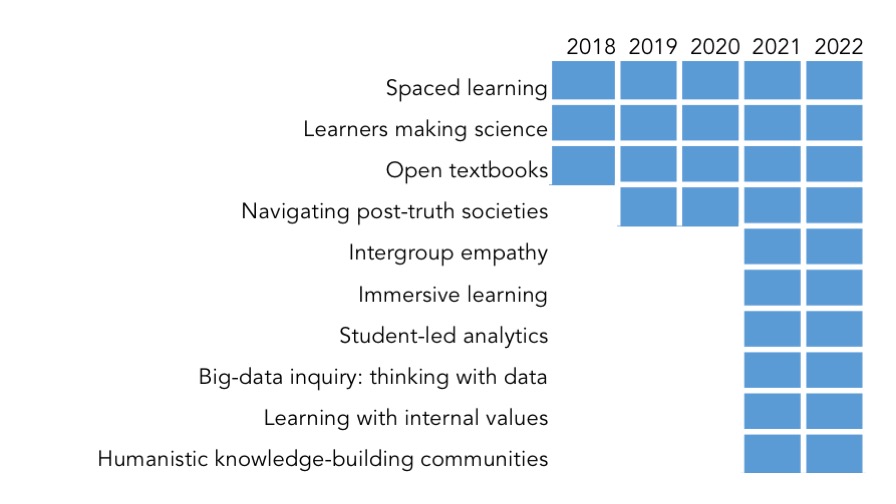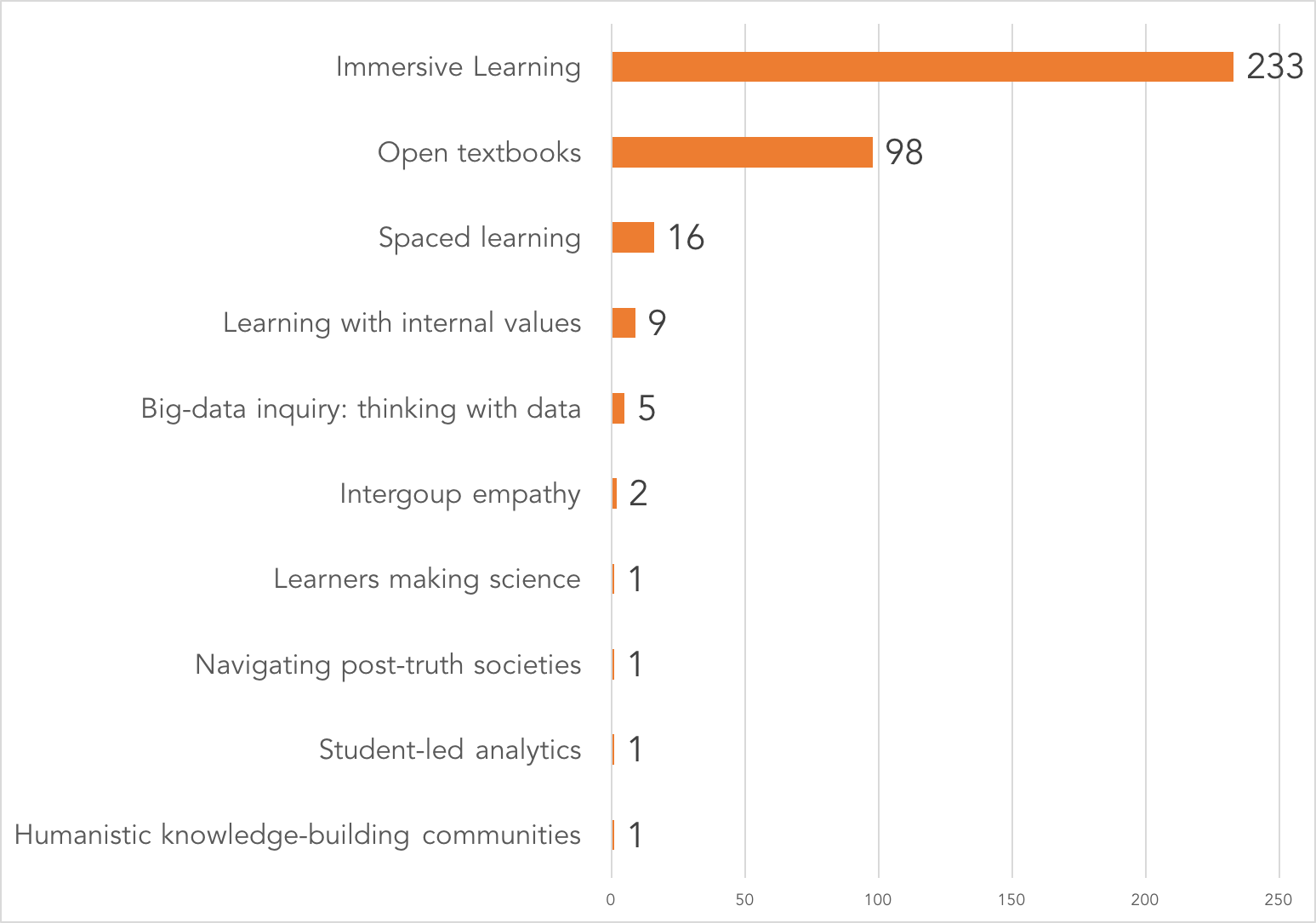Innovating Pedagogy Report 2017

The Open University (OU) has released the 2017 edition of its ‘Innovating Pedagogy’ report. It is the sixth rendition of an annual educational technology trend review that introduces ten pedagogies that are already in currency but have not yet had a profound influence on educational practice. While the timelines may remind you of the Horizon Report, the methodology for gathering the trends is different. The NMC Horizon Team uses a modified Delphi survey approach with a panel of experts, the ‘Innovating Pedagogy’ report is authored by a team of twelve researchers from the Open University. The 2017 edition was compiled in collaboration with researchers from the Learning In a NetworKed Society (LINKS) Israeli Center of Research Excellence (I-CORE). As in previous years, the Innovating Pedagogy report discusses innovations that have the potential to provoke major shifts in educational practice. Each trend is rated based on its impact (high or medium) and placed on a timeline for adoption (ongoing, 2-5 years, 4+ years).

Overview of 2017 Innovating Pedagogy trends timeline
Summary of Innovating Pedagogy Trends
- Spaced learning: Recent research on spaced learning has discovered that long-term memories of complex topics can be formulated in minutes. Based on this research, studies have been conducted on spaced teaching of curriculum topics, and found that 90 minutes of spaced learning could have very similar outcomes to months of study. Further research is needed on spaced learning.
- Learners making science: There is growing evidence of the need for citizens to develop a strong command of and to engage with STEM (Science, Technology, Engineering and Mathematics) topics. Knowledge and skills related to STEM topics are relevant to almost all jobs in the workplace. STEM knowledge and skills can be developed in the public, including young people of all backgrounds, through citizen science activities, projects, and events, which have increased in number and scale due to advances in technology.
- Open textbooks: Open textbooks is a form of Open Educational Resources where books can be modified and adapted by educators and students. Open textbooks are helping to reduce textbook costs, and are also leading to increases in recruitment, retention, and pass rates. Using open textbooks can help to further student learning through their ability to actively engage with and add to the learning material.
- Navigating post-truth societies: In our current society, it is more important than ever for individuals to be able to effectively and critically evaluate and judge sources of information in order to assess it’s validity. One way to promote this mindset is to integrate these skills into curriculum.
- Intergroup empathy: In order to improve relations between groups of people, it is important to develop empathy in the group members. In online environments, certain pedagogical strategies can encourage intergroup empathy, including development of empathy in three areas: empathic resonance, empathic reasoning, and empathic response. There are platforms available that allow educators to use gaming technology to develop learning environments focused on intergroup empathy in students.
- Immersive learning: Immersive learning involves an experience of being transported to another environment. This can provide individuals with engaging and memorable learning experiences, and can improve education in a variety of disciplines. Students can use various forms of technology to experience immersive learning.
- Student-led analytics: Student-led learning analytics allow learners to create their own goals, related to their own interests, and then support them to reach these goals. Student-led analytics allow the learners to be in control, and to share their learning journeys with peers and teachers.
- Big-data inquiry: thinking with data: In order to be effectively data literate, it is important to understand big data, which leads to the needs for students to interact with and learn from data early on. Students need to learn about the biases and potential false interpretations that are possible when relying on conclusions from big data. Big data has created evolving goals in data education. In order to effectively prepare students to work with data, students need to be given opportunities to engage with data, as well as to interpret data.
- Learning with internal values: Basing learning in a student’s own needs, interests and internal values causes students to put in the effort that is needed to learn. However, this can be difficult to create due to the learning requirements put in place by national curriculums and external values. Giving students choices on what and how they learn increases their sense of ownership of their learning, which can also lead to more efforts to develop personal growth through learning. There have been recent technological advances that help to enable learning to be personalized, focusing on the social aspect of learning.
- Humanistic knowledge-building communities: Combining the person-centered approach of humanistic education with the idea-centered approach of knowledge-building communities allow for students to learn and develop skills in innovative ways. In these learning environments, students develop and build knowledge, while also considering their own personal interests, and in turn, as they consider themselves, they are guided by their new knowledge. Understanding learning as a combination of person- and idea-centeredness allows for important insights to be made.
Which of these are trending in the AACE Community?
How prevalent are the pedagogy trends highlighted in the report? We checked the 100,000+ records of LearnTechLib- the AACE Learning Technology Library. Here are the results:

Summary
The Innovating Pedagogy report is unique among tech trend summaries in that it focuses on teaching over technology. This report highlights ten innovations that have potential to create major changes and innovations in educational practice. Overall, the Innovating Pedagogy report is a must-read for both practitioners and researchers.
About the Author
 Allie Alayan has an undergraduate degree in psychology from Indiana Wesleyan University and a masters in clinical psychology from Wheaton College. She is currently a Senior Researcher for the Center for Learning and Innovation at Indiana Wesleyan University. Allie has conducted research surrounding video learning and self-explanation.
Allie Alayan has an undergraduate degree in psychology from Indiana Wesleyan University and a masters in clinical psychology from Wheaton College. She is currently a Senior Researcher for the Center for Learning and Innovation at Indiana Wesleyan University. Allie has conducted research surrounding video learning and self-explanation.
Further Information
Ferguson, R., Barzilai, S., Ben-Zvi, D., Chinn, C.A., Herodotou, C., Hod, Y., Kali, Y., Kukulska-Hulme, A., Kupermintz, H., McAndrew, P., Rienties, B., Sagy, O., Scanlon, E., Sharples, M., Weller, M., & Whitelock, D. (2017). Innovating Pedagogy 2017: Open University Innovation Report 6. Milton Keynes: The Open University, UK. https://iet.open.ac.uk/file/innovating-pedagogy-2017.pdf

Kgomotlokoa LInda Thaba-Nkadimene
May 24, 2018 at 2:56 am
I am a university lecturer and teaching Business studies pedagogy. Topics on innovative technology are very interesting and making core of my teaching in teacher education in one of rural University in South Africa.
I found a topic on spaced learning very interesting, and i want to explore it further, and see how it can be factored as one of a topic in my book project on ‘Methods of Teaching and Pedagogy of Business Studies’.
Stefanie Panke
June 12, 2018 at 12:45 pm
Did you try out spaced learning? If yes, would you like to share your experiences on AACE Review?
Would you like us to write a post specifically about this approach?